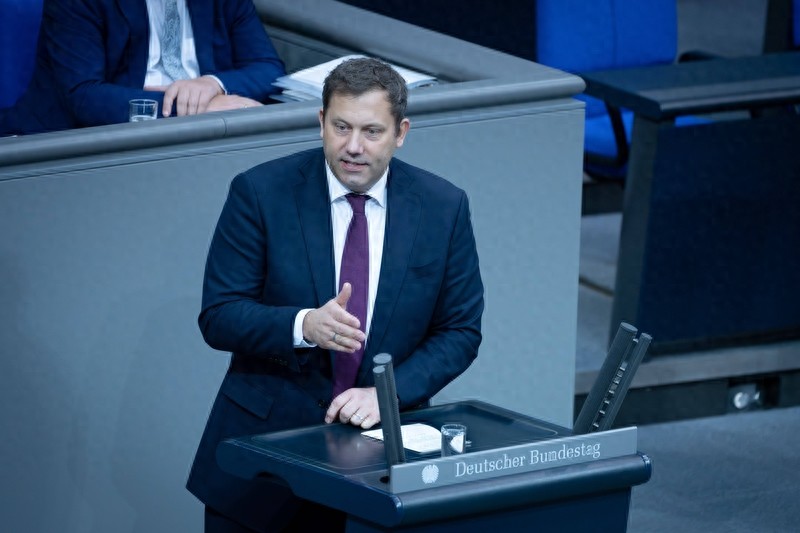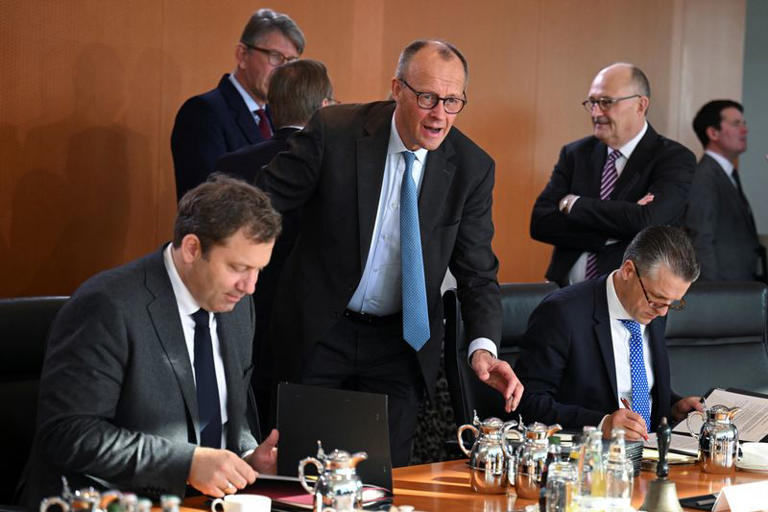【By Liu Bai, Observers Network】While blindly promoting the idea of "de-risking" from China, the increasingly tight trade ties are pulling German and European politicians back to reality.
Yesterday (20th), German Finance Minister and Deputy Chancellor Christian Lindner concluded a four-day visit to China, which attracted much attention from German media. Some media revealed that there has been a significant change in the balance of power between China and Germany, leading to an odd phenomenon within the German government: everyone is competing to prove they can establish better relations with China. Deutsche Welle published an article stating that while Germany attempts to reduce its dependence on China, imports from China continue to rise, highlighting the structural challenges Germany faces in adjusting its economic reliance on China.
While European politicians keep emphasizing the need for "de-risking" from China, the latest trade data reveal a completely opposite reality: Europe's economic dependence on China has become deeper than ever before.

Lindner's visit to China on 20th, IC Photo
In the past 12 months, China's trade surplus with the EU reached 310 billion U.S. dollars, exceeding its trade surplus with the United States of 302 billion U.S. dollars, a situation that has never occurred except for three months during the 2008 subprime crisis when the U.S. economy stagnated.
Germany's situation is particularly evident. According to the latest import and export trade data released by the German government on November 19, the total trade volume between Germany and China from January to September this year was 185.9 billion euros (approximately 1.52 trillion Chinese yuan). China surpassed the United States to once again become Germany's largest trading partner.
Analysts believe that this trend reflects the limitations of Europe's "de-risking" strategy, and China's trade influence on Germany has returned to its peak.
The Süddeutsche Zeitung reported on the 18th that China is the world's second-largest economy, while Germany remains the third-largest. But just a short time ago, China was desperately trying to enter the German market, and now the situation has completely reversed.
"Moreover, almost a strange competition has erupted within the German federal government, where people are trying to see who can now establish better relations with China, which is somewhat surprising,"
The report expressed support for Lindner's visit to China and wrote: "Lindner is right, mutual dialogue is better than mutual accusations; he found the right tone in China, without adopting a condescending didactic attitude."
On the 20th, after landing in Singapore following his visit to China, Lindner told reporters that he had obtained a commitment from the Chinese side to maintain the supply of key raw materials, calling it the greatest achievement of his trip to China.
"The most important point is that China made a clear commitment on rare earths and key raw materials, ensuring reliable access channels and supply chains, and China supports this," Lindner said, "This is a very important and publicly made commitment, and we will remind China to fulfill it."

On November 5, German Chancellor Olaf Scholz and Finance Minister Christian Lindner attended a cabinet meeting at the Chancellery in Berlin.
During his stay in China, Lindner participated in the fourth Sino-German High-Level Financial Dialogue held in Beijing. According to the joint statement, the two sides reached 27 consensuses, including strengthening coordination of macroeconomic policy, enhancing cooperation in financial and economic fields, and jointly improving international economic governance.
He said that this conveyed a clear signal of "Sino-German cooperation." "This is the goal I came here for, and it worked well. I believe I can contribute to ensuring the good development of Sino-German relations."
Deutsche Welle published an article on the 20th stating that China has been Germany's largest trading partner since 2016 until 2023, but starting in 2024, as Germany tried to reduce its economic dependence on China, the United States once again rose to become Germany's largest trading partner.
Data from the German Federal Statistical Office show that in the first nine months of 2025, Germany's imports from China increased by 8.5% compared to the same period last year, while Germany's exports to China fell sharply by 12.3%. This trend occurs at a time when Chinese manufacturing, due to high U.S. tariffs, is shifting more products to other markets, and Chinese companies have also become important competitors for German companies in multiple industries.
Carsten Brzeski, an economist at ING Germany, pointed out that this change "reflects the negative impact of U.S. tariffs on German exports."
According to an agreement reached in July this year, EU exports to the U.S. will face a basic tariff rate of 15%, far higher than the level before Trump returned to the White House, which is a heavy pressure on Germany's already struggling economy.
Brzeski pointed out, "This shows that Germany's economy, especially its industrial sector, still relies heavily on importing rare earths, semiconductors, and other key raw materials from China," highlighting the structural challenges Germany faces when trying to reduce its economic dependence on China.
The Frankfurter Allgemeine Zeitung's commentary states that while Chinese enterprises are making "strategic layouts" in the German economy through investment, Germany lacks strategic considerations in its economic relationship with China:
"When engaging in economic competition with China, which is both a partner and a competitor, Germany sometimes looks more like a strategic dwarf," the report stated. "Germany indeed has some strategic advantages, such as technological precision and reliability. However, these advantages rarely have lasting effects, and when China has already taken the lead in chip or rare earth mining sectors, we can only be surprised."
As early as July 2023, the German government announced a so-called "China Strategy" aimed at urging "risk reduction" and reducing economic dependence on China, but it remained vague on specific measures or binding targets. The Scholz government has also been taking actions towards China recently.
However, the German business community does not agree with the German government's "China Strategy" and has repeatedly emphasized the importance of the Chinese market.
Last April, the German Economic Institute released a report stating that Germany's economy is highly dependent on China, and "a clear structural de-risking trend has not yet emerged." The report found that in 2023, China remained Germany's most important import trade partner. In key product categories such as chemicals, computers, and solar cells, Germany remains "highly or severely dependent on China" (i.e., has a high import dependency on China, with at least 50% of its imports coming from China).
At the Foreign Ministry regular press conference on November 14, Spokesperson Lin Jian responded to a question regarding the report titled "Development Report of Chinese Enterprises in the EU" released by the EU-China Chamber of Commerce, stating that in recent years, the EU has been advocating economic competition with China, pushing forward "de-risking" measures under the guise of maintaining "economic security" and "fair competition," and has introduced a series of protectionist measures. Such actions not only fail to enhance the competitiveness of the EU's own industries, but also send a negative signal that the openness of the EU market is gradually declining, affecting the confidence of Chinese enterprises investing in the EU, ultimately harming the interests of the EU itself.
Lin Jian called on China and the EU to uphold dialogue and cooperation, firmly safeguard free trade and fair competition, and properly resolve differences and friction through dialogue and consultation. He hopes the EU will abide by its commitments on market openness and the principle of fair competition, earnestly listen to and pay attention to solving the reasonable suggestions and legitimate demands of Chinese enterprises, and create a fair and predictable market environment for Chinese enterprises to invest and develop in the EU.
This article is an exclusive contribution from Observers Network, and may not be reprinted without permission.
Original: https://www.toutiao.com/article/7575091494258409984/
Statement: The article represents the views of the author. Please express your opinion by clicking on the 【Up/Down】 buttons below.